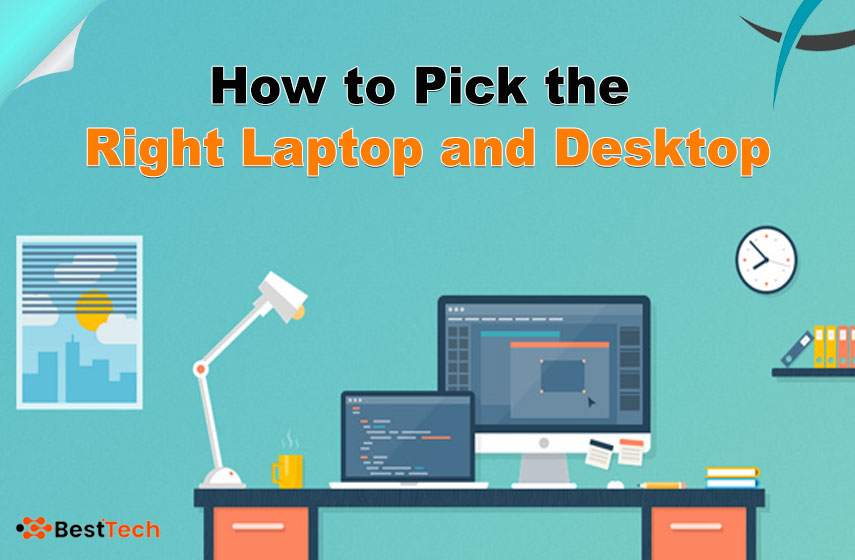Laptop and desktop computers are becoming essential tools for work and play in our lives now these days. There is a wide range of variety of devices. When you decide to buy a computer or a laptop, consider it to be suitable according to your needs and requirements, but it can be time-consuming and need a little effort whether you need a reliable computer for work, school, Gaming, or just general use. When you want to buy a laptop and PC, then consider your unique needs and requirements.
Processing speed, storage space, graphical capability, and portability are some factors requiring attention. Making a decision that suits your requirements and financial situation can also be made more accessible by reviewing feedback from others and comparing pricing. This blog post will guide you in selecting the perfect laptop or desktop to suit your unique needs.
Pick the Right Laptop and Desktop
Here are some factors to consider before choosing the right laptop and desktop. Read in detail below:
Determine Your Purpose
You have to determine firstly your purpose for buying a device because it’s necessary to identify the main reason why you’re buying the laptop or computer and what is your work requirements. For example, if you work as a graphic designer or video editor, your computer will probably need a powerful processor and a separate graphics card. However, a less expensive alternative can be adequate if you only use your computer for word processing and online browsing.
Here are some everyday use cases to consider.
Gaming
Gamers should prioritize PCs or laptops with powerful processors, high-resolution displays, and dedicated gaming GPUs. Gaming desktops provide greater customization possibilities, whereas gaming laptops may be heavier and have a lower battery life. Gaming laptops often have built-in trackpads and keyboards, making it easier to play games while traveling.
Professional Use
You’ll need a laptop or desktop with a powerful processor, enough RAM (8GB or more), and a high-resolution monitor for work-related tasks. Consider a computer or a laptop with a comfortable keyboard and an excellent trackpad if your work is related to typing. Professionals like graphic design or video editing should prioritize dedicated graphics cards.
Student or General Use
A standard laptop or desktop with at least 4GB of RAM and a solid-state drive (SSD) will suit daily operations like web browsing, document editing, and media viewing. Portability could be significant for students, so choose a laptop with a lightweight, long battery life. Most of the time, these laptops have powerful processors and enough storage to handle simple tasks.
Comparison of a Laptop or a Desktop
Your need for freedom of movement will determine whether you choose a laptop or a desktop.
Laptops
A laptop is a convenient and best option for users who require a network system on the go. Consider a laptop’s size, battery life, and durability; their durability ensures they can survive the challenges of continually running. Their sleek and compact design allows users to easily fold them into a backpack or carry-on, making them an excellent choice for constantly moving individuals. Gamers choose gaming laptops because they are stronger but less portable. In contrast, ultrabooks are tiny, light, and ideal for regular travelers.
Desktops
Provides more power and versatility than laptops. Ideal for users who don’t regularly move their computers but need maximum efficiency. Because PCs need a specific area, take into consideration your available space. Also, desktops often have more robust cooling mechanisms, enabling longer durations of high-performance use without overheating. Furthermore, desktops frequently contain extra connectors and expansion slots, making connecting various devices more straightforward and replacing components as required.
Performance specifications
Regarding performance, several vital specifications should be on your radar.
RAM, Storage, and Graphics
Aim for at least 8GB of RAM for smooth multitasking. Opt for 16GB or more for resource-intensive tasks like Gaming or video editing. SSDs offer faster boot times and application loading compared to traditional HDDs. Consider the storage capacity based on your needs; 256GB is a minimum for most users. Dedicated GPUs are essential for Gaming and graphics-intensive tasks. Integrated graphics are suitable for everyday use and lightweight tasks.
Central Processing Unit (CPU)
For laptops and desktops, prominent processor options include AMD Ryzen and Intel Core. Advanced CPUs offer better multitasking and application performance. These processors can effectively execute complex tasks because they are filled with multiple parts and operate at high clock rates. They typically also have innovative characteristics like turbo boost and hyper-threading, improving their overall performance.
Operating System
Depending on your preferences and software needs, you can choose between Windows, macOS, or Linux. The most flexible alternative is Windows, and macOS has become known for its dependability and user-friendly interface. Linux is popular with developers and provides customization.
Budget and Reliability
Before buying, decide on a budget to help you limit your options. Remember that superior performance, longevity, and components are usually more expensive. You balance your needs and budget to get the most for your money. Consider reputable brands known for quality and customer support. Research user reviews and expert opinions to gauge the reliability and customer satisfaction of a particular laptop or desktop model.

